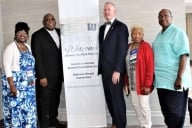You have /5 articles left.
Sign up for a free account or log in.
Lawrence H. Summers, Harvard's embattled president, apologized to faculty members Tuesday not only for his comments about women and science, but for a management style that many have said is too domineering.
"I am committed to opening a new chapter in my work," he said at an emergency faculty meeting that was called at last week's faculty meeting, where Summers was criticized harshly by speaker after speaker. "I pledge to you that I will seek to listen more and more carefully and to temper my words and actions in ways that convey respect and help us work together more harmoniously," he said.
Faculty meetings at Harvard are closed to the press. But accounts based on those who attended the meeting described a different tenor than the previous week's session. At yesterday's meeting, Summers had both defenders and critics. And while Summers could still face a vote of no confidence at a March faculty meeting, there was no attempt at one Tuesday.
Summers has been at the center of controversy since remarks he made last month about women and science became public. In those remarks, he suggested that discrimination is not a major factor in explaining why there are relatively few women in advanced positions in the sciences. Rather, he suggested that women may not have as much aptitude in the sciences as men do.
His comments, which he has since admitted were not as closely tied to research as he suggested at the time, set off an international debate. At Harvard, the debate has become as much about Summers as about women and science.
Today's Boston Globe quotes Caroline Hoxby, a professor of economics, as telling the meeting that the ties between scholars, their colleagues, and their students at Harvard create "a great shimmering web" when the university is working well.
Said Hoxby: "Every time, Mr. President, you show a lack of respect for a faculty member's intellectual expertise, you break ties in our web. Every time you humiliate or silence a faculty member, you break ties in our web. When you engage in speech that harms the university's ability to foster scholarship and that is not thoughtful, not deliberate, and not grounded in deep knowledge, you break ties by the hundreds."
The faculty meeting came amid jockeying on the Harvard campus between supporters and critics of the president, and with evidence that the faculty is not united on the president's tenure.
The Harvard Crimson reported Tuesday on the results of a poll of professors in the Faculty of Arts and Sciences. Asked whether they approved of the president's leadership of the university, 40 percent approved and 52 percent disapproved. But only 32 percent said that Summers should resign and only 38 percent said that they would vote "no confidence" in him.
In the week since the first faculty meeting -- where Summers had but one defender -- more students and faculty members have been speaking up on his behalf, even as critics continue to attack him. A group called Harvard Students for Larry has created a Web site and is organizing letter writing on his behalf. And a number of prominent faculty members -- such as Alan Dershowitz of Harvard's law school -- have publicly backed him.
At the same time, student and faculty groups at Harvard and elsewhere are continuing to point out flaws in his original statements about women and science, which he has since partly disavowed. And the controversy is creating difficulties for other presidents as well.
The presidents of MIT, Princeton, and Stanford stunned many academics when the broke with the convention of not criticizing a fellow president and issued a joint statement that amounted to a rebuke of Summers. This week, female scientists at Yale are criticizing their president for not issuing a similar statement, according to an article in The Yale Daily News.








